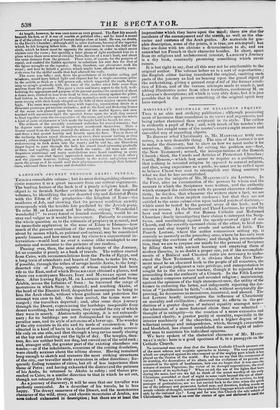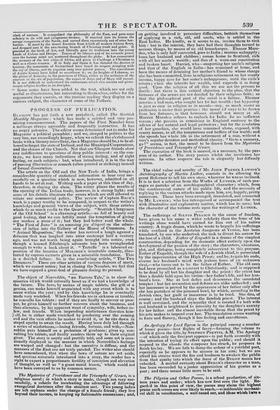MARTINEAU'S RATIONALE OF RELIGIOUS INQUIRY. THIS IS an able and
striking publication ; although possessing more of keenness than soundness in its views and arguments, and being rather rhetorical than scriptural in its style. The author is evidently a pupil of Fox ; and, with much of his master's elo- quence, has caught some of the master's overwrought manner and one-sided way of regarding objects. To discover what Christianity is, Mr. MARTINEAU truly con- ceives, is a very desirable thing. The aim of his Lectures is not to make the discovery, but to show us bow we must inake it for ourselves. His instruments for solving the problem are—first, the New Testament; second, the interpretations of' the Romish Church ; third, the Creeds and Articles of Protestant Churches ; fourth, Reason,—which last seems to require as a preliminary, that nothing in revealed religion be opposed to natural religion, and that, using experience as a guide, we must not be called upon to believe Cluist was sent to accomplish any thing contrary to- what we find he has accomplished.
Such are the subjects of Mr. MARTINEAU'S six Lectures. In the First, after an examination of the persons by whom and the manner in which the Scriptures were written, awl the authority which stamped the collection with its present character ofauthen- ticity, he decides, that whenever the writers state a fact, we are bound to render them implicit credence ; but that they are not entitled to the same submission upon isolated points of doctrine,— which must be tested by the general scope of the book, and by our own reason. In the Second and Third Lectures, lie paints the best and worst sides of the Roman Catholic and Reformed Churches ; freely investigating their claims to interpret the Scrip- tures, and concluding against the openly-avowed right of one Church, and the covertly-assutned claim of the other, to bind con- science and stop inquiry by creeds and articles of faith. The Fourth Lecture, where the author commences setting op, is scarcely so masterly as the preceding ones, where lie has only been criticizing the erections of others ; and though his recommenda- tion, that we are to prepare our minds for the perusal of Scripture by filling them with ancient learning and emptying them of modern theories, is no doubt a proper one, yet if the accomplish- ments of a Biblical and Classical critic are necessary to under- stand the New Testament, it is obvious that the New Testa- ment must be an obscured book to the people of all countries, the right of private judgment a vain privilege, and interpretation be sought for in the viva voce teacher, though it be rejected when
proceeding from the authority of a Church. In the Fifth Lecture the author compares natural and revealed religion ; maintaining, against the opinions of the high atonement-men, the utility of the former in enforcing the latter, and indignantly rejecting the doc- trine of "justification by faith,"—which, without scripturally dis- proving, be denounces as monstrous, unnatural, and absurd. The last Lecture briefly investigates the influence of Christianity on morality and civilization ; discovering its effects in the pro- duction of a greater degree of natural equality amongst men- the admission of a more fraternal claim than was admitted thought of in antiquity—in the creation of a more extensive and associated charity, a greater purity of morality, especially in the
interior machinery of the churches, and a higher degree of in- tellectual courage and independence, which, through persecution and bloodshed, has almost established the sacred right of indivi- dual man to maintain his individual opinions. We have spoken of the rhetorical character of Mr. MARTI- NEAU'S style: here is a good specimen of it, in a panegyric on the Catholic Church.
No instructed man can deny that the Roman Catholic Church presents one of the most solemn and majestic spectacles in history. The very arguments which are employed against its rites remind us of the mighty part which it has played on the theatre of the world. For when we say that the ceremonies of its worship, the decorations of its altars, and the evolutions of its priests, are conceived in the spirit of heathenism, how can we forget that it was once the witness of ancient Paganism, the victor of its decrepit superstitions, the rival yet imitator of its mythology ? When we ask the use of the lights that burn during the mass, how can we fail to think of the secret worship of the early Christians, assembled at dead of night in some vault beyond the eye of obser- vation? When we wonder at the pantomimic character of its services, its long passages of gesticulation, are we not carried back to the time when the quick ear ot the informer and persecutor lurked near, and devotion, findiog words an unsafe vehicle of thought, invented the symbolical language which could be read_ only by the initiated eye? Long and far was this Chutch the sole vehicle of Christianity, that bare it on over the storms of ages and sheltered it amid the
clash of nations. It evangelized the philosophy of the East, and gave some sobriety to its wild and voluptuous dreams. It received into its bosom the savage conquerors of the North, and nursed them successively out of utter bar- barism. It stood by the desert fountain front which all modern history flows, and dropped into it the sweetening branch of Christian truth and peace. It presided at the biith of Art, and liberally gave its traditions into the young hands of Colour and Design. Traces of its labours and of its versatile power over the human mini are scattered throughout the globe. It has consecrated the memory of the lost cities of Africa, and given to Carthage a Christian as well as a classic renown. If in Italy and Spain it has dictated the decrees of tyranny, the mountains of Switzerland have heard its vespers mingling with the cry of liberty, and its requiem sung over patriot graves. The convulsions of Asiatic history have failed to overthrow it ; on :he heights of Lebanon, on the plains of Armenia, in the provinces of China, either in the seclusion of the convent or the stir of population, the names of Jesus and of Mary still ascend. It is not difficult to understand the enthusiasm which this ancient and pictu- resque religion kindles in its disciples.
Some notes have been added to the text, which are not only useful as illustrations, but interesting in themselves, either for the arguments they contain, or the curious reading they display on a curious subject, the character of some of the Fathers.



























 Previous page
Previous page